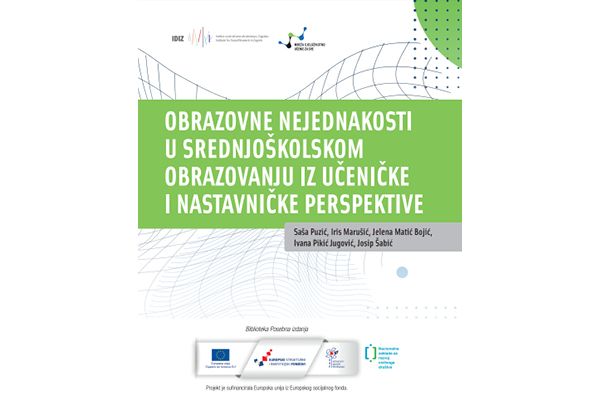Notifications list
Educational Inequalities in Secondary Education from the Perspective of Students and Teachers
Published: 08.12.2023.

Saša Puzić, PhD, Iris Marušić, PhD, Jelena Matić Bojić, PhD, Ivana Pikić Jugović, PhD and Josip Šabić, PhD are the authors of the monograph “Educational Inequalities in Secondary Education from the Perspective of Students and Teachers”. The book was published in the Institute’s Special Editions.
The aim of the research presented in this monograph was to deepen the understanding of various aspects of educational inequalities in secondary education from the perspective of students and teachers. For that purpose, firstly some of the theories important for the explanation and understanding of educational inequalities were presented (the theory of cultural reproduction, the situated expectancy-value theory, the theory of stereotype threat and the minority stress model), along with an overview of recent research into educational inequalities in secondary education in Croatia. In the second part, the results of the present quantitative and qualitative research with secondary school students and teachers were provided. The research was conducted in 25 secondary schools in the City of Zagreb, as well as Krapina-Zagorje, Međimurje, Varaždin and Zagreb Counties. The questionnaire surveys were conducted with students (N=1238) and teachers (N=268), while focus groups included students, and interviews involved teachers. The results of the quantitative research with students show that inequalities in educational outcomes and students' well-being are related to the social background, type of the school programme, gender, as well as the students' vulnerable status. The focus groups with students reveal that they are rather aware of an unfavourable position of certain groups of students at school. Teachers, on the other hand, expressed a high level of accepting and respecting of the values of equality and sociocultural diversity. When it comes to students in an unfavourable position at school, teachers find that poverty and conflict family relations, mental health problems, disability and health problems are the factors mostly reducing the students' chances to succeed in secondary school. Unlike that, students' individual characteristics, such as gender, sexual orientation or ethnicity, are perceived by a significantly lesser percentage of teachers as the source of vulnerability that can decrease the students' educational odds. Nevertheless, teachers also pointed to numerous challenges in working with vulnerable students and the possible prejudice of the teachers themselves towards the vulnerable students at school. The findings confirm that educational inequalities need to be addressed with regard to the differences in educational outcomes, but also according to the differences in students' well-being. It is emphasised that such an integral perspective is an important precondition for schools to compensate, more strongly than previously, the educational chances and opportunities for pupils belonging to various vulnerable groups.
The monograph is part of the project “Thematic Network Lifelong Education Accessible to All (TEMCO)”. The project is co-financed by the European Social Fund and the Republic of Croatia State Budget.
The full text is available at the link.
